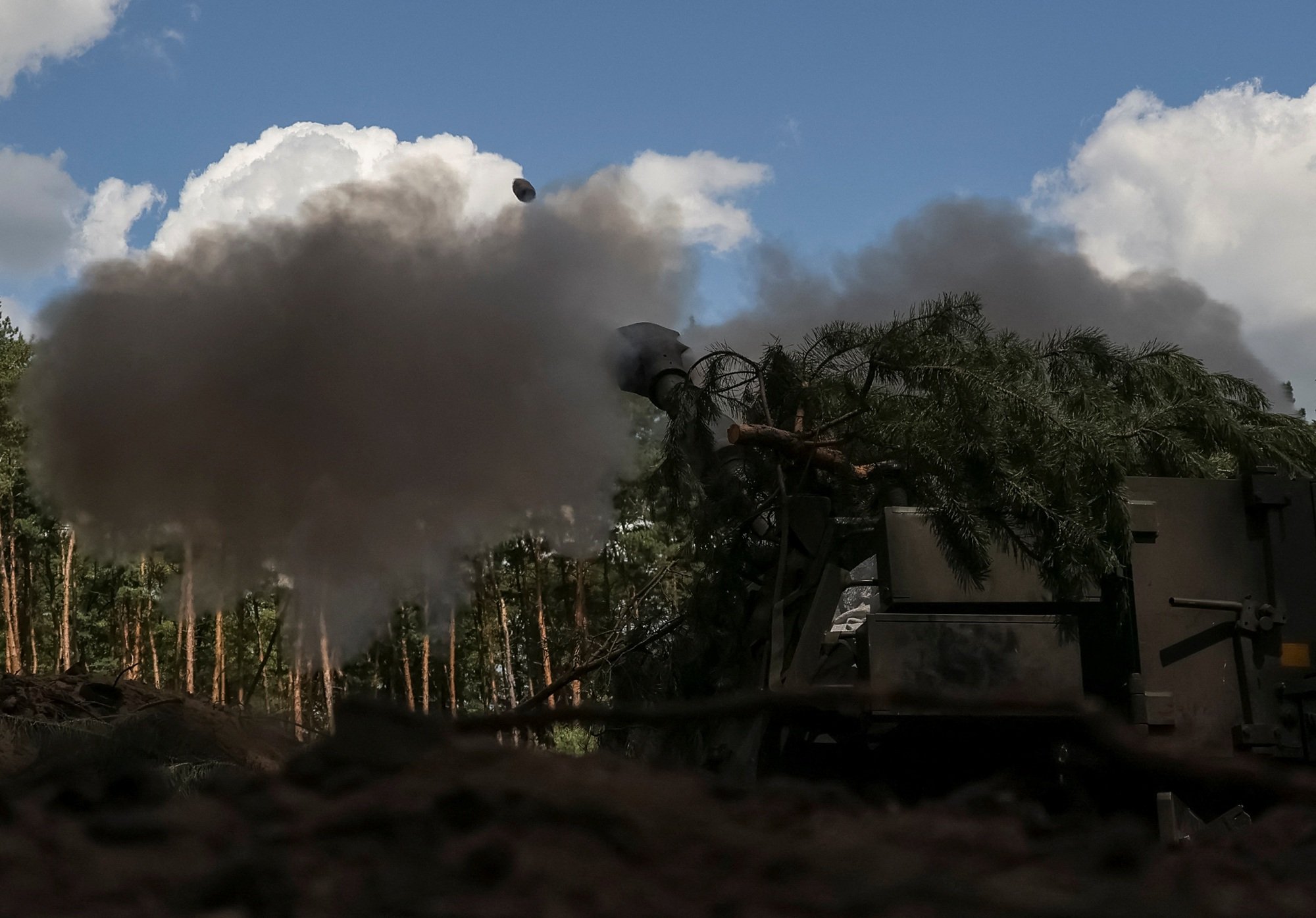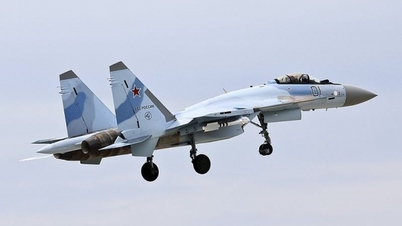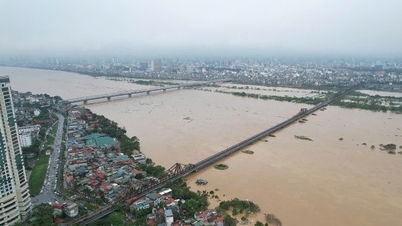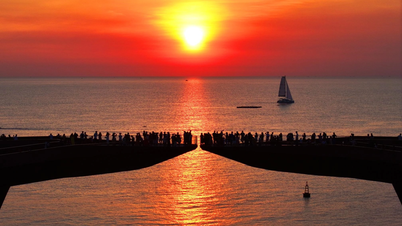
Soldiers of Ukraine's 14th Mechanized Brigade fire self-propelled guns towards Russian forces on the front line on July 19.
The Washington Post on July 20 quoted Ukrainian officials as saying that the country's soldiers had begun using cluster munitions supplied by the US against Russian forces.
Accordingly, this ammunition was brought to the southeastern region of Ukraine and is expected to be used against Russian bases near the city of Bakhmut in Donetsk province.
Quick Look: Day 511 of Operation, Russia Says Part of Black Sea 'Unsafe'; US Wants Ukraine to Make a Breakthrough
A Ukrainian official said his country's soldiers fired cluster munitions at Russian positions, aiming to break up trenches that were slowing down Ukraine's counter-offensive.
The US has a DPICM (Dual-Use Improved Conventional Munition) munition, although the US military has not used this type of munition since 2016.
According to a post on the US military’s eArmor website, the DPICM cluster munitions that Washington will supply to Kyiv will be fired from 155mm guns, each carrying 88 submunitions. Each submunition has a lethal range of about 10 square meters. So a single cluster munition can inflict damage over a range of up to 30,000 square meters depending on the altitude at which the submunitions are launched.
Washington announced on July 7 that it would provide Ukraine with DPICMs to bolster its counterattack capabilities. The move has sparked controversy due to humanitarian concerns over the use of cluster munitions.
According to US officials, the cluster munitions Ukraine received had a failure rate of no more than 2.5%. More than 120 countries prohibit the use, development, production, purchase, storage or transfer of cluster munitions under a 2010 treaty. Ukraine, Russia and the US are not signatories to the treaty.
Receiving cluster munitions, is Ukraine "tired" of fighting the West?
On July 13, the Ukrainian army confirmed that it had received its first batch of cluster munitions, stressing that they would only be used against Russian troop concentrations and not in populated areas, cities or Russian territory.
The Kremlin has threatened to use cluster munitions in response if Ukraine uses them. However, Ukrainian officials say Russia has already used cluster munitions several times.
Russia attacks 2 Ukrainian brigades
TASS news agency on July 20 quoted Russian Defense Ministry spokesman Igor Konashenkov as saying that Russian forces had neutralized "a Ukrainian subversive group" in the Krasny Lyman area.
According to him, the Russian side attacked a signal center and a command post of two Ukrainian infantry brigades within the previous 24 hours.
"In the areas near the settlements of Avdiivka and Torskoye in Donetsk, a signal center of the 110th mechanized brigade of the Ukrainian army and a command post of the 63rd mechanized brigade of the Ukrainian army were destroyed," he said.
Ukraine under pressure to make a decisive breakthrough in the counter-offensive
In addition, Russia said it repelled 16 Ukrainian attacks in the Donetsk region, causing damage to the enemy in the area and intercepting seven rockets from Ukraine's high-mobility artillery rocket system (HIMARS) and 32 drones.
Ukraine has not commented on the above information.
Notably, Reuters reported that on July 20, the Russian Defense Ministry said that the country continued to "retaliate" against Ukraine, targeting targets in Odessa and Mykolaiv.
Accordingly, the Russian side launched a strike with high-precision weapons from the sea and air, targeting factories and warehouses for unmanned boats in the Odessa and Chornomorsk regions. In the Mykolaiv city area, Ukrainian fuel infrastructure and ammunition depots were destroyed.
Danger for Russia's Black Sea Fleet
The White House said on July 20 that the US was "deeply concerned" about Russia's attacks in the Black Sea region.
"We are deeply concerned about what we are seeing in the Black Sea today," said White House deputy press secretary Olivia Dalton, referring to three consecutive days of Russian attacks on Ukrainian port cities and signs that Russia may attack civilian vessels in the area.
Russia warns ships to Ukraine through the Black Sea, how does the US react?
However, Russia affirmed that it did not prepare to attack civilian ships in the Black Sea as accused by the US, according to Reuters.
The Kyiv Independent news site on July 20 quoted an intelligence report from the British Ministry of Defense saying that Russia's Black Sea Fleet would likely play an active role in blocking trade routes, but the blockade would be at risk from Ukrainian UAVs and cruise missiles.
Intelligence analysts note that Russia's withdrawal from the Black Sea Grain Initiative on July 17 has undermined the effectiveness of security guarantees for passing cargo ships.
However, this decision may have actually been made some time ago as the deal no longer serves the Kremlin's interests, according to the report.
Brazilian President: The world is tired of the Ukraine conflict
From July 20, Russia began to treat all ships passing through the Black Sea to Ukraine as military cargo ships and as Russian targets. In response, the Ukrainian Defense Ministry announced that it would also treat all ships arriving at Russian and Ukrainian ports in the Black Sea controlled by Russia as ships capable of transporting military goods, starting from July 21.
Source link


![[Photo] Prime Minister Pham Minh Chinh chairs a meeting of the Government Standing Committee on overcoming the consequences of natural disasters after storm No. 11](https://vphoto.vietnam.vn/thumb/1200x675/vietnam/resource/IMAGE/2025/10/09/1759997894015_dsc-0591-jpg.webp)
![[Photo] President Luong Cuong attends the 80th Anniversary of the Traditional Day of Vietnamese Lawyers](https://vphoto.vietnam.vn/thumb/1200x675/vietnam/resource/IMAGE/2025/10/09/1760026998213_ndo_br_1-jpg.webp)



![[Photo] General Secretary To Lam visits Kieng Sang Kindergarten and the classroom named after Uncle Ho](https://vphoto.vietnam.vn/thumb/1200x675/vietnam/resource/IMAGE/2025/10/09/1760023999336_vna-potal-tong-bi-thu-to-lam-tham-truong-mau-giao-kieng-sang-va-lop-hoc-mang-ten-bac-ho-8328675-277-jpg.webp)





























































































Comment (0)